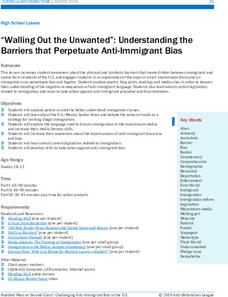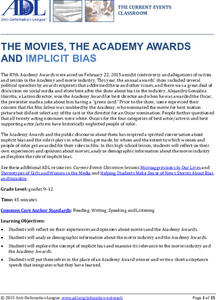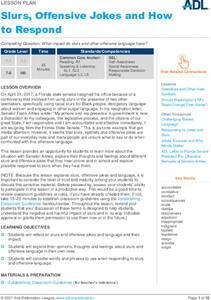Curated OER
Prejudice
Students read story, Nipper, and explore and demonstrate understanding of concept of prejudice. Students create definition of prejudice, and describe negative experiences they may have had with people who are different from themselves,...
Curated OER
Sexual Stereotypes in Japan
Students are introduced to the various stereotypes faced by women in Japan. In groups, they discover the types of discrimination women received because of the stereotypes and how they have confronted them over time. They develop their...
Curated OER
Racial Stereotypes in the Media
Students examine how stereotypes function in the media. They discuss the role and nature of stereotypes, watch a clip from the movie, 'Bend It Like Beckham,' and write a response paper about cultural representations in the movie.
Curated OER
Challenging Regional Stereotypes
Young scholars analyze the regional stereotypes that exist in Whales and formulate personal opinions about these views. Students discuss the impact of adjectives used to describe people from different regions of the U.K.
Wadsworth Atheneum Museum of Art
Can Girls Do That?
Why be limited by stereotypes? Young scholars examine a series of works of art, list the different ways boys and girls are represented, and then discuss the common stereotypes found in the works. They then search for art that does not...
Teaching Tolerance
Using Photographs to Teach Social Justice | Exposing Gender Bias
Young sociologists are asked to read two photographs, identifying how the photographer uses point of view, color, pose, light, and shadow to express a stereotype of women or to challenge those stereotypes. Partners then create their own...
National Endowment for the Humanities
Harriet Jacobs and Elizabeth Keckly: The Material and Emotional Realities of Childhood in Slavery
Young historians learn how to make generalizations based on primary sources in a instructional activity that uses the autobiographies of two women born into slavery. The class watches a historical re-enactment of scenes from the lives of...
Learning for Justice
Challenging Gender Stereotyping and Homophobia in Sports
Young learners are asked to challenge what they see as stereotyping and homophobia in sports and the arts. Participants read an article about sexual orientation in the NFL and statements from public figures like Theodore Roosevelt. They...
Anti-Defamation League
Should Washington's NFL Team Change Their Name?
"What's in a name?" Is it irrelevant, as Juliet suggests in Shakespeare's play, or is nomenclature deeply significant? Young scholars weigh in on the debate by examining the controversy over the NFL's Washington, D.C. Redskins. Groups...
The New York Times
Collateral Damage? Researching a Connection Between Video Games and Violence
Hook your class into an exploration of and discussion about violence in video games with a cute animal clip and a video game trailer. After a quick discussion about how media can affect mood, class members read a related article and...
Teaching Tolerance
Using Photographs to Teach Social Justice | Exposing Homelessness and Poverty
Photos can capture a complete story in a single image. Class members closely examine a photo of a homeless camp and attempt to read the story told by the picture. They then read the caption for the photograph and compare their notes with...
Anti-Defamation League
Is Gaming a Boy's Club? Women, Video Games and Sexism
High school juniors and seniors investigate the representation of women in video games. They watch a video of researcher Anita Sarkeesian who describes the response to her research attempts, and read articles related to the topic. To...
Curated OER
Interpreting Perspective
Work on characterization with a narrative writing lesson plan, in which middle schoolers interpret a character's perspective. They discuss family traditions and examine how culture can influence a character's perspective. Next, they read...
Media Smarts
First Person
High schoolers explore the relationship between video games and actual population. Example: A 2005 study showed Latino youth play at higher rates than other groups, but there are no Latino playable characters. They watch a brief video...
Facing History and Ourselves
Blending In and Standing Out
An excerpt from Sarfraz Manzoor's memoir about how his experiences as a Pakistani growing up in England shaped the way he though about his identify provides a stimulus for a discussion of how experiences can shape our concept of identity...
Teaching Tolerance
Introducing 'The New Jim Crow'
When Jim Crow Laws ended, the intent behind them did not. Academics read "The New Jim Crow Laws" and an interview from the author to understand how racism has not ended, but rather changed over time. The lesson explains how prejudices in...
Teaching Tolerance
Understanding the Prison Label
Break the chain. An engaging lesson examines why it is so hard to break free of the prison system in the US. Academics participate in a reader's theater, read primary sources, and discuss their thoughts. The lesson explains the hardships...
Anti-Defamation League
Student Dress Codes: What's Fair?
The controversy over school dress codes continues. The debate involves questions like, why is there a policy? Who sets the policy? Who enforces the policy? What is a fair policy? Tweens and teens have an opportunity to engage in the...
Anti-Defamation League
“Walling Out the Unwanted”: Understanding the Barriers that Perpetuate Anti-Immigrant Bias
As part of a study of immigrant bias, high schoolers investigate the language used in blogs, readings, media reports, and current legislation whose language perpetuates xenophobia. They then consider ways they can get involved in...
Anti-Defamation League
What "Draw-A-Scientist" Reveals about Gender Stereotypes
What do you picture when you hear the word scientist? Challenge scholars to put pencil to paper, draw a scientist, and then reflect on the patterns they observe. Learners read an article about a female scientist and write a story about a...
Anti-Defamation League
The Movies, the Academy Awards and Implicit Bias
"And the award goes to. . . " High schoolers investigate bias in the movie industry by reading articles, watching a short video, and examining data about the Academy of Motion Picture Arts and Sciences (AMPAS) membership, nominees, and...
Anti-Defamation League
Slurs, Offensive Jokes and How to Respond
How to respond to slurs and offensive jokes is the topic of a lesson designed for middle and high schoolers. After journaling about their experiences with slurs and nasty jokes, participants read an article about a Florida State Senator...
Curated OER
'Song of the South' a racist tune?
Pupils read the information about the movie "Song of the South" and watch some of the clips. They write their reaction to the proposal to re-release the movie. Students consider whether it would matter if the studio adds an introduction...
Anti-Defamation League
Identity-Based Bullying
What is identity? What is bullying? What is identity-based bullying? After discussing these questions as a class, pupils engage in partner discussions before participating in a small group activity to act out bullying scenarios. Then,...

























